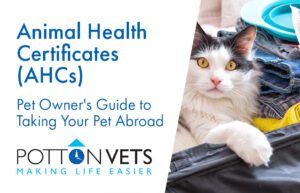Having just picked up your new puppy, you are excited about your puppy and want to do the best for it. Now where to go from here?
There are a number of topics to cover including worming, flea and other parasite control, socialisation, vaccination, nutrition, insurance and so much more.

Where do you go?
We believe that you are going to provide the best start for your puppy by coming to see us at Potton Vets. Our vet provides a full half an hour consult on your first visit, this time is used exclusively for a full examination, careful evaluation and advise regarding you and your pet specifically. There really is no “one shoe fits all” solution.
One of the many confusing topics is puppy vaccinations, with contradicting information from vaccination companies, breeders, other vets, friends, dog trainers, groomers, the internet etc.
The importance of Vaccination and Socialisation:
Part of the confusion starts because there is a contradiction, what is best from a socialisation point of view (i.e. get them socialised as early as possible) is at odds with what is best from a vaccination point of view (keep them away from potential risk as long as possible).
There are, however, well established principles that help us make a sensible decision through the maze of confusion!
Maternally derived antibodies (MDA)
One of the causes of vaccination breakdown (i.e. the vaccine does not appear to work) is that if you vaccinate a puppy while it is still protected by its mothers antibodies the vaccination can be weakened or useless. This protection from the mother is handed down through maternally derived antibodies (or MDA). We cannot easily predict what these levels will be in an individual puppy, or when exactly the best time to vaccinate that puppy is. We do, however, know that a puppy is extremely unlikely to have enough MDA to neutralise a vaccination by the time it is 14 weeks old. This is why we recommend a final primary puppy vaccination at or 14-16 weeks of age.
Other truths:
It is also true that the bulk of puppies will actually be protected by vaccinations finishing at 10-12 weeks.
Another truth is that we want puppies to go out and explore their environments, meet new people and dogs to become socially well adjusted from as young an age as possible.
What to do?
So bearing in mind there is no completely risk free option, we recommend a final puppy core vaccination at 14-16 weeks, and expose your puppy to other vaccinated dogs in safe areas from a young age. Avoid high risk areas (e.g. parks – where you cannot possibly know if the area is contaminated) until fully vaccinated.
I hope this has helped in understanding the challenges of the not so “simple” primary vaccinations, we encourage you to discuss this further face to face at your first vaccination with our vets (half and hour), or with our nurse (half an hour) at the second vaccination.
Below is a link to the BSAVA and WSAVA guide to vaccination – an interesting bed time read! Enjoy.
Alan
————————- ———————— ———————– ————————- ————————– ——————– —————–
WSAVA – Vaccination guidelines
“We should aim to vaccinate every animal with core vaccines, and to vaccinate each individual less frequently by only giving non-core vaccines that are necessary for that animal.” WSAVA
Pup Vaccination and the 12 Month Booster
“Most pups are protected by MDA in the first weeks of life. In general, passive immunity will have waned by 8–12 weeks of age to a level that allows active immunization. Pups with poor MDA may be vulnerable (and capable of responding to vaccination) at an earlier age, while others may possess MDA at such high titres that they are incapable of responding to vaccination until ≥12 weeks of age. No single primary vaccination policy will therefore cover all possible situations. The recommendation of the VGG is for initial vaccination at 8–9 weeks of age followed by a second vaccination 3–4 weeks later, and a third vaccination given between 14–16 weeks of age. By contrast, at present many vaccine data sheets recommend an initial course of two injections. Some products are also licensed with a ‘10 week finish’ designed such that the second of two vaccinations is given at 10 weeks of age. The rationale behind this protocol is to permit ‘early socialization’ of pups. The VGG recognizes that this is of great benefit to the behavioural development of dogs. Where such protocols are adopted, great caution should still be maintained by the owner – allowing restricted exposure of the pup to controlled areas and only to other pups that are healthy and fully vaccinated. The VGG recommends that whenever possible a third dose of core vaccine be given at 14–16 weeks of age.
In immunological terms, the repeated injections given to pups in their first year of life do not constitute boosters. They are rather attempts to induce a primary immune response by injecting the attenuated virus (of modified live virus [MLV] vaccines) into an animal devoid of neutralizing antibody, where it must multiply to be processed by an antigen presenting cell and stimulate antigen- specific T and B lymphocytes. In the case of killed (inactivated) vaccines, MDA may also interfere with this immunological process by binding to and ‘masking’ the relevant antigens. Here repeated doses are required.
All dogs should receive a first booster 12 months after completion of the primary vaccination course. The VGG redefines the basic immunization protocol as the ensemble of the pup regime plus this first booster. The 12 month booster will also ensure immunity for dogs that may not have adequately responded to the pup vaccinations.”
GUIDELINES FOR THE VACCINATION OF DOGS AND CATS
COMPILED BY THE VACCINATION GUIDELINES GROUP (VGG) OF THE WORLD SMALL ANIMAL VETERINARY ASSOCIATION (WSAVA)

Is It Worth Getting A Pet Health Plan?
Is it Worth Getting a Pet Health Plan? (Like Pet Health Club) Owning a pet brings immeasurable joy, but it also comes with responsibility. Regular

